FRANCE'S COLONIES
By P. A. LAPIE (Former Governor of Chad)
T1-IE French must not deceive themselves about the post-war situation. On the one hand we see those who are possessed with the idea of an international police force, operating by sea and air, and who concern themselves with the prospects of one Power or a group of Powers having to occupy naval and air bases through- out the world. On the other, we see even now being planned and hammered out arrangements for food-relief and the distribution of raw materials, even of processed materials, which amount in practice almost to the establishment of clearing-houses exchanging manu- factured, goods against the local products. We see in the third place several different countries beginning to employ the same political devices in those of their colonies situated in the same part of the world and sharing the same interests. If France wishes to take her place at an International Colonial Council, she must at once set about the organisation of an inter-colonial federation. For that, she must initiate reforms in three spheres : in her technique of government ; in her outlook upon native affairs ; and in her readiness for intercolonial action.
However paradoxical it may seem, a new French colonial policy requires first and foremost that the French Administration should concern itself a little less with the internal government Of each colony. That is the first necessity. The second is that the soldier and the white business man realise once for all that the colonies were not made for them, but that France is called upon to create in each colony a nation which one day will take its place in the world concert. Thirdly, it is necessary for France to guide her colonies into the world movement towards federation exemplified by the British Empire, Soviet Russia, and, in one form or another, North America and China.
As to the firsrpoint, all our administrators and all business men complain of the excessive tutelage of the Colonial Ministry. This tutelage was the more onerous in that it was often exercised by officials who had never been in the colonies, as well as because contact with the colonies was established Only by Colonial Inspec- tors, or, in the case of the older colonies, by the Deputies repre- senting those colonies. These two contacts were totally insufficient, the one having only a narrow official viewpoint, representing an indifferent leadership, the other having often only limited electoral interests, and in all cases a restricted outlook.
In order to restore individual initiative to the colonies, it would be necessary to give to each colony, or group of colonies, self- government, as will be seen below. It is not true to say that, once deprived of continual guidance, a Governor would not know how to apply adequate driving force to his territory. On the contrary, it is the permanent apprehension . of not being approved by th Central Government which has resulted in so many Govern° doing nothing at all. The higher the colonial servant rises, th truer this is. The young head of a sub-division is full of enthusias and personal initiative. The further he rises, the dimmer the qualities become.' It is the fault of an over-centralised administra tion. The devolution of colonial government on local capitals h already achieved some degree of decentralisation. The Moth Country must lay down the principles ; but their detailed applicatio must conform with the spirit each Governor-General should im to his group of colonies. In internal affairs, moreover, the Govern should himself decentralise still further.
It will be understood that such a change will involve modifica tions in the training of colonial administrators. It would b necessary for those in high places to bear in mind that a Govern has not only to rule over coloured peoples, but has, above all, control and advise the white elements of the population,—adminis trators, officers and settlers ; and that as Governor of an independen colony or group of colonies, he must be able to enter into relation with other States than France, with neighbouring colonies, and wit, foreign Governments, with which questions of shipping and aria tion policies arise. This is why it is necessary to take the greates care in selecting a potential Governor from the members of th colonial service. I do not advocate an Ecole des Marechaux fo Colonial Governors ; we have already too many academies an diplomas. But there is clearly room for a change in the condition of training for work in the Colonies, this training .having become merely a cramming process and at the same time a. race for th best appointments. Appointments go to those who acquire the most facts. Once in his colony the theorist perceives.that all he has learnt is quite useless, and that what he needs are common sense, tact, good health; character, and a certain insight. None of these qualities is particularly—helpful to promotion under the presen system.
Regarding my second point, Prance had the great distinction o sounding to the world in 1789 the humanitarian call to equality between men and equality between peoples. For that reason it has often been concluded in France as in England that it is necessary immediately to introduce so-called " democratic " institutions, such as universal suffrage and trial by jury, to populations then in the feudal stage or even more undeveloped. Without saying, as critics of democracy too often do say, that the result has been a disaster, it must be said that this process has not eased the work of govern- ment ;- and also that, when such institutions are imposed suddenly and violently, they destroy the true political traditions of the natives and apply a European habit of thought to minds not yet adapted to it. It is better to guide the native's evolution in his own usages ; fostering and expanding those which in the course of years can be made to lead a native society little by little to the point at Which its members can understand what, because we adhere to it, we suppose to be enlightenment.
Many colonies today are in a condition of crisis precisely because the traditional feudal institutions exist in one part of an area, while, in other parts, " democracy," as exemplified by trial by jury an the holding of elections, has begun to be asserted. hi Such cases, there is an extremely delicate transition-stage, the importance of which can be well foreseen ; emancipation is better accomplished by steps than by leaps. Whatever his origin, whatever the reason for his presence on colonial territory, the European must bear in mind that he is, politically and economically, in collaboration with the owners and workers of the soil and forests and waters, not to mention the minerals ; that is. to say with the population found in each territory. Our first duty is to the native population, to improve their health, to enlarge their outlook, to make them collaborators instead of slaves, until they begin to achieve a national self-consciousness. Traders will be ultimately rewarded not only by having labour on the spot, but by the eventual creation of a market for imported goods. It is better to state these points bluntly, for they are true. If a native population is exploited and reduced to some kind of slavery ashamed of its name, the policy is not only inhumin, but foolish, for white labour cannot be used in those climates, and a potentially important market will never be created.
As to the future in other countries, colonial policy is in .full volution. The discourse of Colonel Stanley, English Colonial retary, on July 13th, 1943, the interview given by Field Marshal muts to an American review in December, 1942, the speech of Curtin in Australia last July, the despatch of technicians to the glish colonies and of students to the workshops of the Mother untry, the organised distribution of foodstuffs and raw materials, s in the Near East, the search for international security through rial and naval bases, all these make.up a total of extremely urgenr oblems, and in the decisions regarding them France should say r word. In my view, that word should be Federation.
It is important to take in hand the problem of the foreign rela- ons of the colonies. From the economic point of view, the uestion is of the first importance. It immediately involves reper- ssions upon trade with the Mother country. From the diplomatic int of view, we must apprehend difficulties with neighbouring oreign territories. I believe it is necessary to tackle this subject ith firmness. Either it is desired to form a federation of the con- tituent territories of the French Empire, placing more and more ponsibility upon each of them, or it is not so desired. If eration is wished for, we must encourage each colony to develop is separate initiative. This should involve giving the colonies wer to negotiate customs agreements, economic treaties, and even ertain undertakings of a military kind, in particular with relation the air. The central government will continue able to oppose hat is not in accordance with its general corpus of policy. These are to my mind the three fundamental courses which France ust follow without delay in order that she may resume her place d prominence in the concert of colonial Powers.



























 Previous page
Previous page